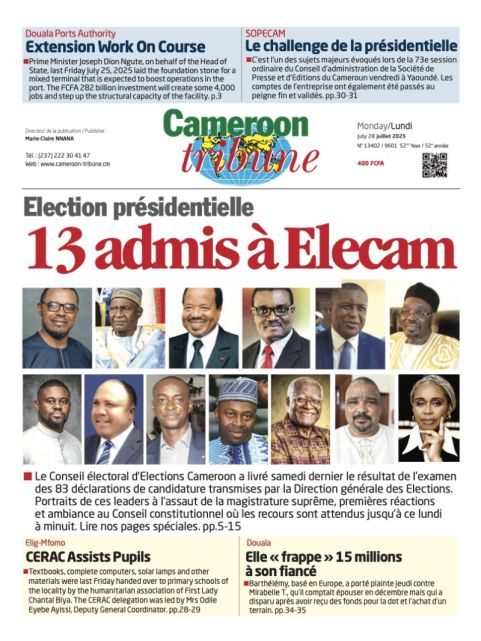Upholding Rights Of Citizens
- Par Richard Kometa
- 20 déc. 2019 15:47
- 0 Likes
So many arguments have cropped up over the bill instituting the General Code of Regional and Local Authorities which was adopted in the National Assembly on Wednesday 18 December, 2019 at the ongoing extraordinary session of Parliament. Senators are now going to take over and give their own reading of the document which has witnessed much debate across communities and groups in the country.
The challenging circumstances the country is facing do justify the wide attention that the Bill has attracted since government submitted it in Parliament on Friday 13 December, 2019. Besides the restive situation in the North West and South West regions and the growing desire by Cameroonians across the board to take greater control over the management of their own affairs, there was the promise by President Paul Biya after the Major National Dialogue in Yaounde from 30 September to 4 October 2019 that the recommendations of the confab will be methodically examined.
Consequently, the Bill does not only seek to address specific concerns, but has taken into account several other worries that citizens continue to express, especially with regard to the demographic evolution in most major towns in the country. Even practices which already existed like the protection of minorities have still been fine-tuned in the current Bill.
Curiously, Section 246 (1) of the Bill which states that; “The city mayor shall be a native of the region of attachment of the city council,” has been at the centre of controversy. The movement of citizens to any part of the country is a right. But such demographic shifts witnessed in most cities in the country where urban Councils have been created in most cases have also, in some situations, led to tension between those who come in and original inhabitants of the major towns. The appointment of Government Delegates in the past was generally reserved for original inhabitants of specific localities. Such a move had apparently been seen as normal by many since no one raised a finger at the time.
Of course, the preamble of the Constitution of Cameroon says; “The State shall ensure the protection of minorities and shall preserve the rights of indigenous populations in accordance with the law.” Some people have tried to oppose such a provision of the Constitution to the desire by Cameroonians and the political will to foster the “Living Together” drive in the country. Yet, all would agree that no matter the form given to the sense of harmony and peaceful coexistence among Cameroonians, it may never be proper for any ethnic group to swallow up the other and the over 200 ethnic communities in the country that have specificities which need to be harnessed and made to mend walls rather than foster cracks.
That probably explains why local councils have people from all sociological groups that exist in any cosmopolitan area even if they might all not lay claim to the post of city mayor. The new provision is simply a reminder or an improvement of what existed in the past. Since the post of Government Delegate has been suppressed, there was need for measures to ensure a balance in the way councils are ma...
Cet article complet est réservé aux abonnés
Déjà abonné ? Identifiez-vous >
Accédez en illimité à Cameroon Tribune Digital à partir de 26250 FCFA
Je M'abonne1 minute suffit pour vous abonner à Cameroon Tribune Digital !
- Votre numéro spécial cameroon-tribune en version numérique
- Des encarts
- Des appels d'offres exclusives
- D'avant-première (accès 24h avant la publication)
- Des éditions consultables sur tous supports (smartphone, tablettes, PC)











Commentaires